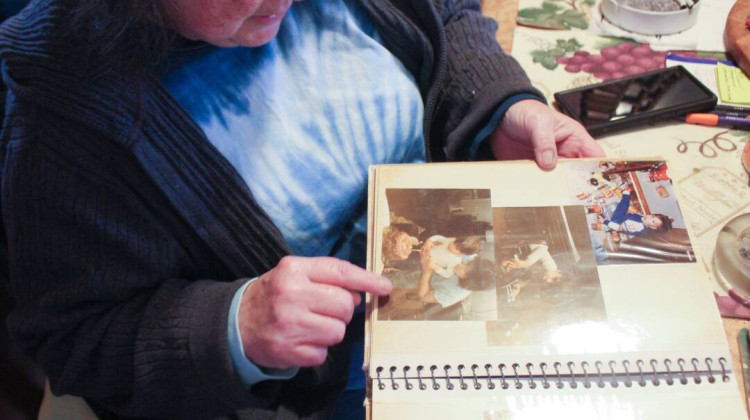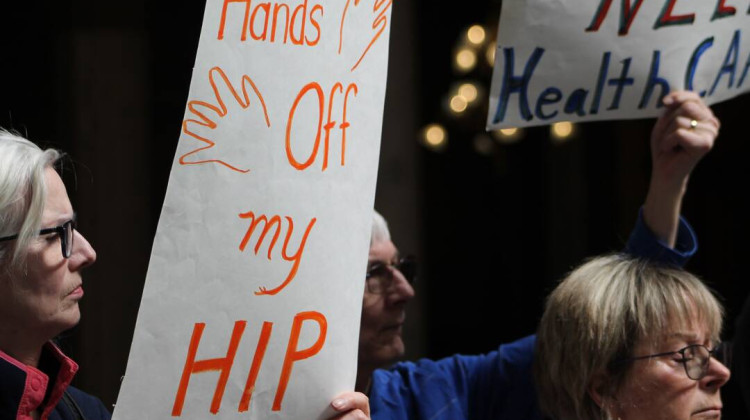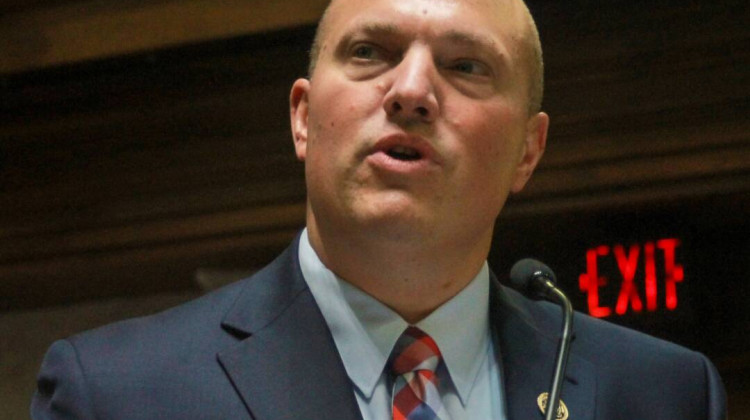
Voters try to maintain social distance as they wait in line at the Indianapolis City-County building on primary election day.
Lauren Chapman/IPB NewsThe Indiana State Department of Health reported 25 additional confirmed deaths since Sunday, bringing the state’s total to 2,265. The state announced more than 40,000 total confirmed cases, with more than 363,000 Hoosiers tested.
Pandemic Food Stamp Benefits Delayed For Some Families, FSSA Offers Help Line
Families and parents have questions about how and when they’ll receive new pandemic-related food stamp benefits, but the state says families should be able to call the agency for answers.
The pandemic benefit provides a one-time boost in food stamps to families whose kids normally get free or discounted meals at school. The amount families should receive per child is calculated by using the cost of meals at school multiplied by the average number of school days kids missed when the COVID-19 pandemic hit.
The state says people don't have to do anything to get the benefits; they should have received a new card in the mail or had them added to their existing food stamps card.
Indiana Family and Social Services Administration (FSSA) spokesperson Marni Lemons says people should call 800-403-0864 if they have any questions.
As Casinos Reopen, Workers Say Affordable Health Insurance More Important Than Ever
As Indiana casinos reopen, they’re implementing sanitization and distancing standards at gaming sites, but some workers say one important virus-prevention strategy is being left out: access to affordable health insurance.
Labor union Unite Here Local 1 recently surveyed more than 200 workers at three Indiana casinos and one in Illinois about their access to health insurance. It says Ameristar, a casino in East Chicago, is the only one of the four that doesn't allow workers to buy the union's health insurance.
As a result, workers there reported significantly higher rates of having to insure children through public programs like Medicaid and having $1,000 or more in medical debt.

Workers at several other casinos in Indiana have staged rallies in recent months asking their casinos to provide better health insurance plans with lower premiums.
Indiana Congressman: Schools, Colleges Must Open Or Lose Federal Funds
An Indiana congressman introduced a bill that would block federal funding for schools and colleges if they don’t offer classroom teaching by this fall.
U.S. Rep. Jim Banks (R-Columbia City) told a Fox Business host that the goal of The Reopen Our Schools Act is for schools to resume in-person, classroom teaching by Sept. 8. Banks said the bill is to “incentivize” and “prod” schools to reopen. If the law was passed, schools could lose vital funding for classroom teaching and other efforts if they did not open by the deadline.
The proposal comes as a new study finds the average school will need an additional $2,300 per student to open this fall.
The purpose of the legislation is "to prohibit the Secretary of Education from providing funding to certain educational institutions unless the institutions return to in-person instruction, and for other purposes." The bill, co-authored with Republican Wisconsin Rep. Tom Tiffany, was introduced last week. The full legislation was not available Tuesday on Congress.gov.
Only One Incumbent Lost In Indiana Primary Amid COVID-Altered Election
Indiana recently closed the book on maybe the most unusual election in its history – a primary, delayed by a month, that featured expanded vote-by-mail.
And in the midst of a pandemic, when voter contact was harder than ever, only one Statehouse incumbent lost. And she was only technically an incumbent: Rep. Dollyne Sherman (R-Indianapolis) was caucused into her seat by a small group of Republican precinct committeepeople just last year.

Join the conversation and sign up for the Indiana 2020 Two-Way. Text "elections" to 73224. Your comments and questions in response to our weekly text help us find the answers you need on COVID-19 and the 2020 election.
Mike Downs Center for Indiana Politics Director Andrew Downs says that’s not an accident. Incumbency, he says, was likely an even bigger advantage this cycle, even as people had more time – via vote-by-mail – to research the candidates.
“People are skeptical enough of what they read online that if your website, as a challenger, sounds good they don’t automatically accept everything that’s written there," Downs says. "And so they know what they get with the incumbent.”
All IN: Can The U.S. Handle A Second Wave Of COVID-19?
It’s been three months since COVID-19 first hit the U.S. Many states are well on their way to reopen. But there’s still no vaccine. Indiana Public Broadcasting’s All IN talked with an epidemiologist and a hospital executive who reflected on the past three months and talked about what to expect as states continue to open.
Indiana University-Purdue University Director of Epidemiology Education Tom Duszynki says at the beginning of the pandemic, the expected number of infections and deaths looked grim. But he says the preventative measures states took helped slow the virus.
"In the absence of a vaccine and the absence of solid proven treatment, we were really able to bend that curve,” Duszynki says. “Those simple actions of good hand washing, physical or social distance were able to have an effect.”
Contact Lauren at lchapman@wfyi.org or follow her on Twitter at @laurenechapman_.
 DONATE
DONATE






 Support WFYI. We can't do it without you.
Support WFYI. We can't do it without you.